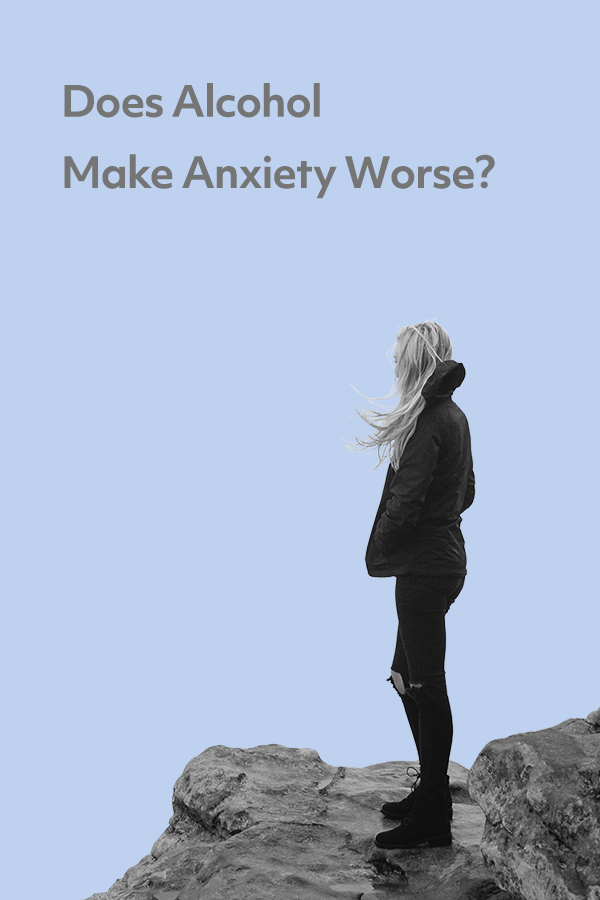Are you handling your anxiety by “relaxing” with a drink? Consider other coping methods.
For some people, relaxing with a drink after a stressful day seems like a logical step. Heck, millions of people do it every day. Alcohol is even marketed as a great stress reliever. But you may not be aware of the physiological effects alcohol has on the brain and body of someone who struggles with anxiety. Alcohol can actually make anxiety worse.
What is anxiety?
Anxiety is a broad term used to describe several different anxiety disorders, including generalized anxiety disorder, panic disorder, social anxiety, stress, phobias, PTSD, and certain depressive disorders. Most often when people refer to anxiety, they mean generalized anxiety disorder.
Generalized anxiety disorder affects 6.8 million adults of the US population. This disorder has similar symptoms to panic disorder and obsessive-compulsive disorder, including persistent and excessive worry even when there is no apparent reason for concern, restlessness, lack of tolerance and irritability, tension in your body, and difficulty concentrating.
Oftentimes, anxiety disorders co-occur with other mental health disorders, like substance use disorder. This is called having a dual diagnosis. This is common because alcohol is used to self-medicate the symptoms of depression. For example, 20 percent of people with social anxiety also struggle with alcohol use disorder.
Does alcohol make anxiety worse?
The short answer is yes. Alcohol does make anxiety worse. Here’s why: as a depressant, alcohol may initially help a person feel calm and relaxed. But it also changes brain chemistry, which can worsen anxiety.
Do you ever feel a lot of anxiety the day after a heavy drinking episode? This is why. In fact, the Anxiety and Depression Association of America, indicates that around 7 percent of Americans struggle with alcohol-induced anxiety.
Increased anxiety is also a symptom of alcohol withdrawal for those who have alcohol use disorder. Symptoms of alcohol withdrawal also include: sweating, vomiting, nausea, hallucinations, increased heart rate, and even seizures.
What are some effective ways to treat anxiety?
There are a range of anxiety medications available through a medical provider. Some of them, like benzodiazepines, while effective, can become addictive, so some providers will limit their prescription to a short period of time. Some non-addictive anxiety medications include antidepressant drugs (SSRIs and SNRIs), Beta Blockers, hydroxyzine, and Buspirone. You can read more about non-addictive anxiety medications here.
Many people find that the most effective treatment plan for anxiety is a combination of medication and psychotherapy. Your medical provider will be able to address your specific concerns and make recommendations.
What are some other ways to relieve stress?
There’s a variety of ways to relieve stress and anxiety, in addition to or instead of taking medication—your physician can advise you what is best for your particular situation. Some non-medication options to destress and relieve anxiety include:
- Meditation
- Yoga
- Exercise
- Journalling
- Mindfulness
When you’re struggling with anxiety, it can be easy to dismiss lifestyle suggestions. After all, you’re suffering! Why would eating more vegetables and whole grains help? But evidence supports the claims that lifestyle recommendations (like a healthy diet) do make a difference to stress and anxiety. Here are some of the lifestyle recommendations that can help to relieve stress and anxiety:
- Getting at least 8 hours of sleep
- Healthy eating
- Eating regularly
- Reducing caffeine
- Engaging in fun activities
- Therapy (individual and/or group)
Additional resources for anxiety
There are a number of helpful tools and resources available from the following organizations about anxiety disorders:
National Alliance on Mental Illness
Anxiety and Depression Association of America
Centers for Disease Control and Prevention, Division of Mental Health
National Institute on Mental Health









